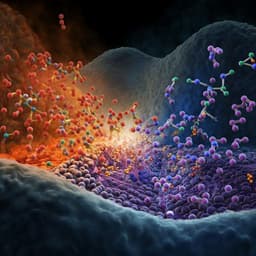
Medicine and Health
Adipocytes control food intake and weight regain via Vacuolar-type H⁺ ATPase
R. C. Zapata, M. Carretero, et al.
This innovative study delves into the molecular mechanisms of weight regain after obesity-induced weight loss, revealing that 'metabolic memory' resides in adipocytes. Researchers highlighted *ATP6v0al*, a key regulator identified in a *C. elegans* screen, as a promising therapeutic target for obesity, based on findings from a team led by Rizaldy C. Zapata and Maria Carretero.
Related Publications
Explore these studies to deepen your understanding of the subject.







